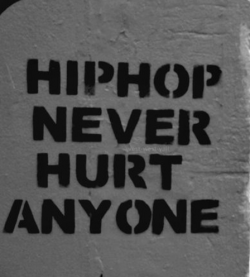
Nina Simone once said, “You cannot be an artist and not speak on the times.” When writing rap—which some say stands for rhythm and poetry—it’s important to remember that this genre has a tradition of speaking to the times.
Rap: Rhythm and Poetry
Rap music was cultivated by Black people living through racial tension and terror in a “desegregated world.” Rap was born out of parties and joy and escapes from racialized oppression. Rap helped express trials and pain by unpacking subjects like the school-to-prison pipeline, gentrification, and food apartheids (also called food deserts). Rap also helped express love and joy.
Rap is an art of using poetry, rhythm, and rhymes over beats. You can rap to tell a story or to celebrate something or just because. One great thing about rap is its flexibility. You can say words how you want to make them flow better and fit into your rhyme scheme. You can rap exactly how you talk. You can play with its structure too.
If you want to be a better rapper, we’ve got you covered with some tips to find your rhythm, rhymes, and poetry.
Find Your Rhythm: 9 Tips for Improving Your Rap Skills
1. Dive into the culture. You may have your own flavor to share, but you are not the first rapper ever. Study other rappers and their lives, rhyme patterns, melodies. Study how artists sample other artists and build intertextuality. Find rappers who inspire you. Get a better understanding for hip-hop culture and rap broadly to be intentional about where you want to fit in.
2. Find your flow. Your flow usually describes when you feel most inspired and uninhibited. As a rapper, this may mean you’re inspired with new lyrics, beats, or other sounds. Take a step back and reflect on your rapping. Do you tend to find your flow during a specific time or place? Is it after eating something or being in a certain mood? When you find your flow, protect it and use it well.
3. Think of topics. Get inspired. Rap can be about anything. This can be a blessing but also a curse. The possibilities of things for you to write about are endless. Start jotting down topics that inspire your rap, your rhythm and poetry. It could be anything from contextualizing the latest news report or saying how you really feel about high school.
4. Dedicate time to it. It’s easy to want to do something and get good at it, but you have to make time for it too. Even if you’re juggling school and jobs, it’s important to sit down, focus, and write. Plenty of the hottest rappers came from situations where they had to dedicate themselves to rap to get good at it. No excuses here.
5. Focus on the page, not yourself. When you write, it’s easy to write two lines, hate a word from the first, and focus on it for way too long. When writing, don’t be too hard on yourself. If you struggle with actually writing anything when you sit down to write, you might want to set up some personal rules. Try freestyling or setting a timer for time you have to write without going back to cross anything out.
6. Share what you do. Ask for feedback. When you have something you’ve finished, try sharing it with someone you trust. It can be scary to share your art because it tends to be a deeper look into you. As you work on your rapping though, it’ll be very hard to improve without the feedback of others. Find someone or a handful of supportive friends who will listen to you and share constructive criticism to help you get better.
Before you know it you'll grow your stage presence and turn the world into your stage!
7. Practice, practice, practice. “Practice isn't the thing you do once you're good. It's the thing you do that makes you good,” thought-leader and writer Malcolm Gladwell said. You have to practice your writing and your delivery, and it’s best to do so consistently. Every opportunity you don’t take to practice and refine your craft is time wasted where you could have grown.
8. Get familiar with your voice. That means get confident with how you sound, and get familiar with how you talk. Rap how you talk. If you’re shy or ashamed of your voice, this will come through whenever you share your work. Remember how essential it is to practice writing? It’s just as important to practice listening to yourself and appreciate how you sound.
9. Rhyme dictionary. Rap is abundant with clever sounds and rhymes. To improve your own rhyming, it’s okay to get started with some help from a rhyming dictionary. This tool is specifically designed to help writers find rhymes which may otherwise take ages. Some rhyming dictionaries even include alliteration. Check out RhymeZone.
To this day, rap is one of the most versatile and rhythmic forms of music and art in general. What started off being considered a second-rate art form turned into a cultural epicenter for an entire community and, eventually, country. As writers and poets you can do anything, including writing a rap. Now that you’ve learned more about the connections between rap, rhythm, and poetry, write your own rap and share it with writers like yourself on PowerPoetry.org.
